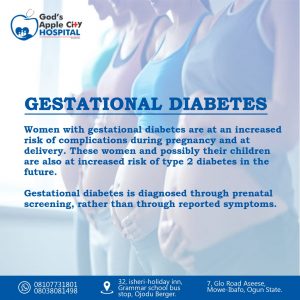Gestational Diabetes
Gestational diabetes is hyperglycaemia with blood glucose values above normal but below those diagnostic of diabetes. Gestational diabetes occurs during pregnancy
Women with gestational diabetes are at an increased risk of complications during pregnancy and at delivery. These women and possibly their children are also at increased risk of type 2 diabetes in the future.
Gestational diabetes is diagnosed through prenatal screening, rather than through reported symptoms.
Health impact Gestational Diabetes
Over time, diabetes can damage the heart, blood vessels, eyes, kidneys, and nerves.
Adults with diabetes have a two- to three-fold increased risk of heart attacks and strokes(1).
Combined with reduced blood flow, neuropathy (nerve damage) in the feet increases the chance of foot ulcers, infection and eventual need for limb amputation.
Diabetic retinopathy is an important cause of blindness, and occurs as a result of long-term accumulated damage to the small blood vessels in the retina. Diabetes is the cause of 2.6% of global blindness(2).
Diabetes is among the leading causes of kidney failure(3).
Prevention Gestational Diabetes
Simple lifestyle measures have been shown to be effective in preventing or delaying the onset of type 2 diabetes. To help prevent type 2 diabetes and its complications, people should:
achieve and maintain a healthy body weight;
be physically active – doing at least 30 minutes of regular, moderate-intensity activity on most days. More activity is required for weight control;
eat a healthy diet, avoiding sugar and saturated fats; and
avoid tobacco use – smoking increases the risk of diabetes and cardiovascular disease.
https://web.facebook.com/Godsapplecity
read other blogs https://godsapplecityhospital.com/breast-cancer-signs-and-detection/




